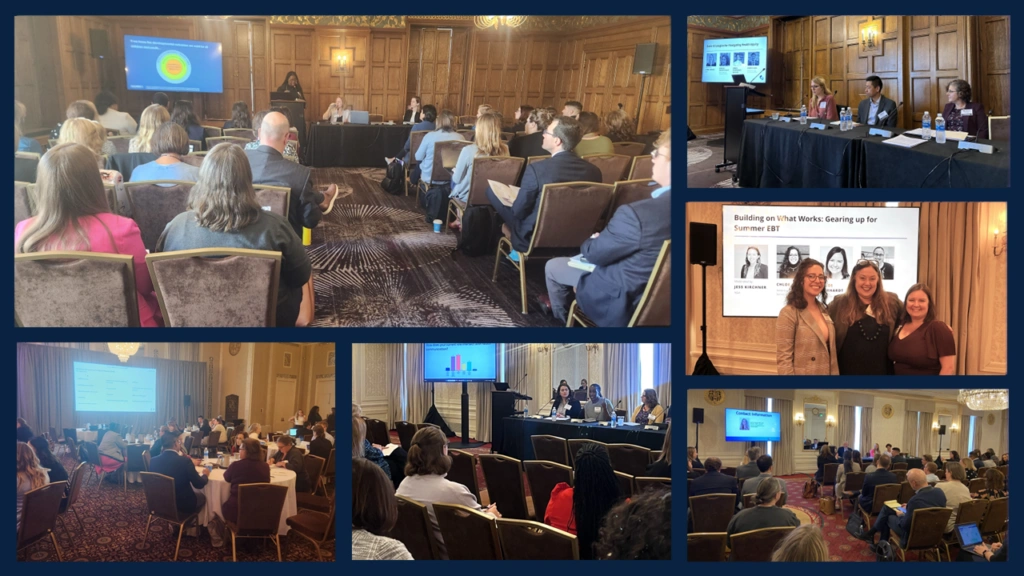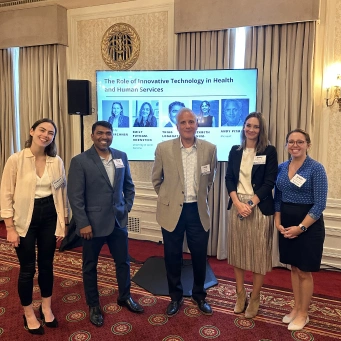
Cardinality at the National Governors Association Health and Human Services Symposium
Milwaukee, Wisconsin, Oct 2-3, 2023 – An exciting gathering of minds took place at the National Governors Association's (NGA) annual Health and Human Services Policy Advisors Institute in Milwaukee, Wisconsin, on October 2nd and 3rd. This event brought together Governors' staff from 32 states and 4 territories, creating a platform to discuss the most important challenges in healthcare and human services. (source: NGA Health and Human Services Policy Advisors Institute)
Thiag Loganathan, President & CEO of Cardinality, discussed the key factors to consider while HHS agencies embrace the latest technologies such as automation, AI, and analytics.
Thiag was part of a distinguished panel featuring Emily Putnam-Hornstein, Co-Director of the Children's Data Network at the University of North Carolina, Elizabeth Bynum-Sorrell, Researcher at the Beeck Center for Social Impact & Innovation, and Andy Pitman from Microsoft. A special nod to Jess Kirchner for moderating this session.
Appreciate the leadership of Marianne Gibson - Behavioral Health Program Director and Jordan Hynes - Program Director-Children and Families from NGA, for organizing this highly impactful event on such a relevant and pressing topic.


The panel emphasized several key points regarding AI's role in government solutions:
- AI as an Enabler: AI doesn't replace human decision-makers but enhances their decision-making capabilities.
- Ethical AI Use: Responsible and unbiased use of AI is essential, especially when serving vulnerable populations. Guardrails and checklists can help ensure ethical AI deployment.
- Pros and Cons of AI: It's crucial to distinguish where AI is genuinely helpful from where it might be overused or gratuitous.
- Future State Preparedness: Policymakers need to consider where AI will lead us in the next decade and how this technology will impact their roles.
- Differences Across Sectors: AI's implementation varies in public health, healthcare delivery, and human services. Opportunities for engagement across programs like Medicaid and child welfare were discussed.
- Complexities of AI Implementation: Implementing AI, especially in engagement with vulnerable populations, can be complex. Mitigating harmful biases and maintaining best practices is essential.
- Balancing Technology and Humanity: The challenge is maintaining the "human side" of health and human services while incorporating advanced technologies effectively.
- Efficiency and Service Delivery: Opportunities exist to capitalize on technology and efficiency innovations to improve service delivery for providers and beneficiaries.
- AI Training: Enabling end-users and stakeholders with necessary AI-related training and skills is vital for effective AI usage.
The Brand of AI
“What’s the brand of AI?” - that was a question for Thiag.
Trying to demystify AI, Thiag shared his perspective, "AI's rapid arrival is a reality, it’s been fast, and it's here to stay. It's not the stuff of ominous science fiction tales like The Terminator or Skynet; we're a long way from that. However, we deal with pressing issues like deepfakes and misinformation, perpetrated through AI in our current landscape. Hence, establishing ethical frameworks becomes all the more important"
Key Takeaways
These were identified as the key priorities for 2024:
- Healthy Families - childcare access, child welfare improvements, better nutrition, maternal healthcare, and quality education.
- Behavioral Health - youth mental health, substance abuse prevention, system enhancements, and integrating mental health with general healthcare.
- Healthcare System - Improving healthcare, funding, and affordability for all.
- Community and Social Impact - housing and community development's role in health.
- System Enhancements - Improving child welfare, disability support, and technology for more effective services.
As the symposium advanced, a central theme emerged - the pivotal role of data in healthcare and human services. The discussions began with a resounding call for the right information to guide decisions. Challenges in data collection and use were acknowledged, with participants exploring innovative technological solutions.
Breakout sessions covered diverse topics, from optimizing healthcare practices and financing to professional training and partnership development.
The second day started with a discussion on ensuring equitable healthcare access, regardless of financial means, leveraging technology for enhanced services.
The event concluded with a vital conversation about aiding families dealing with substance use issues, emphasizing early detection and providing equal opportunities for all, regardless of their background.
A Vision for a Brighter Future
The symposium showed that technology and new ideas have the power to improve healthcare and human services. As we look ahead, we recognize that a combination of human knowledge and technology has the potential to significantly improve the experiences of citizens and caseworkers while enhancing the efficiency of our systems.
Cardinality, along with its technology, partners, and experts, is ready for this journey and is committed to making human services better and benefiting our communities.




